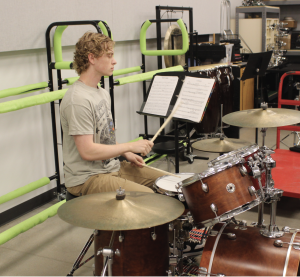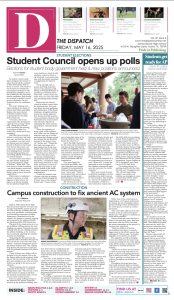“Bulldawg Nation” leaves lasting impression on Bowie
November 13, 2017
“…and have a great day Bulldawg Nation!” “Bulldawg Nation?” Immediately the room scoffed, rolling their eyes with confused expressions, “When has anyone called us Bulldawg Nation?”
Now I wouldn’t say that Bowie High School lacks student spirit, but it’s definitely a different sort of school spirit. School spirit at Bowie is a good-natured joke. An over-exaggerated sarcastic monologue with underlying tones of reluctant love (or at least like) for our school. Most of us really actually like Bowie, but we’re never going to admit that.
But every morning this year Principal Robinson has uttered the cheerful words “Bulldawg Nation”, and every morning students have made fun of it. Not out of malicious intent, but because no one talks about Bowie that way, and we weren’t used to it. Yet.
The cycle continued for those first two weeks, until one day Robinson forgot to say “Bulldawg Nation”, and this time good-humored ridicule didn’t come from my 1st period.
It was a sigh of disappointment.
People actually missed “Bulldawg Nation,” and when Robinson did say it, people cheerfully echoed “Bulldawg Nation” back. If they made fun of it, it was out of sarcastic fondness, like the vast majority of jokes made about our high school. And then it became a chant at the football games. A casual term uttered in the hallway. It made it onto t-shirts, on posters. All of a sudden, “Bulldawg Nation” had taken Bowie by a storm, and many students had readily accepted the term they used to deny.
Now I believe that “Bulldawg Nation” has a good effect on the school; it’s a little term that makes our day just a tad bit brighter and unifies the school. However, it is most certainly not a good thing that we were able to subconsciously abandon our old traditions in under a month; the speed of which students went to distrusting skepticism to full-blown acceptance is alarming.
“Bulldawg Nation” shows that if someone with a lot of influence begins repeating the same phrase, or idea, to the public, the public will eventually come around to the idea, accept it as fact, apply it to their lives, or it will simply cease to be a point of concern. This could either lead to apathy of important issues or acceptance of warped, contrary ideas to our original belief system.
When we hear one thing over and over again from people in authority over us, we tend to believe it. A teacher could be teaching us the wrong thing, but how many of us are going to question them? The government could be telling us the wrong thing, our news stations and Facebook feeds, but how many of us fact check? When we see a story on the news and then again on social media we tend to accept it as fact, going back to the issue of fake news and the distrust of the media.
Or on social media itself, we see trends such as the bottle flip, the ice bucket challenge, and popular memes rise to popularity in a matter of days and then fade off. Even in our speech patterns, abbreviations used on social media get accepted into our day-to-day speech and eventually lose their original meaning. How do we go from thinking scrunchies and lots of makeup was stupid in the 2000s to full blown acceptance of these trends today?
“Bulldawg Nation” could of invaded our use of diction as we got to know our new principal more or maybe because of how many times we heard it. Maybe the early indoctrination of the term in the morning announcements adding it to our daily routine; a number of factors go into the change-of-heart the student body underwent in regards to the phrase. The freshman don’t even know any different.
“Bulldawg Nation” ultimately has a good effect on the school in raising school spirit, but we must be careful about what we choose to introduce into our lives. We never questioned our acceptance of the term, we never thought about the effects, or why we decided to like it, we just adopted it blindly. If we can mindlessly do this in such little time over a small issue, can we, and do we, do it on the things that have a huge effect on our lives, communities, belief systems, and nation? 







